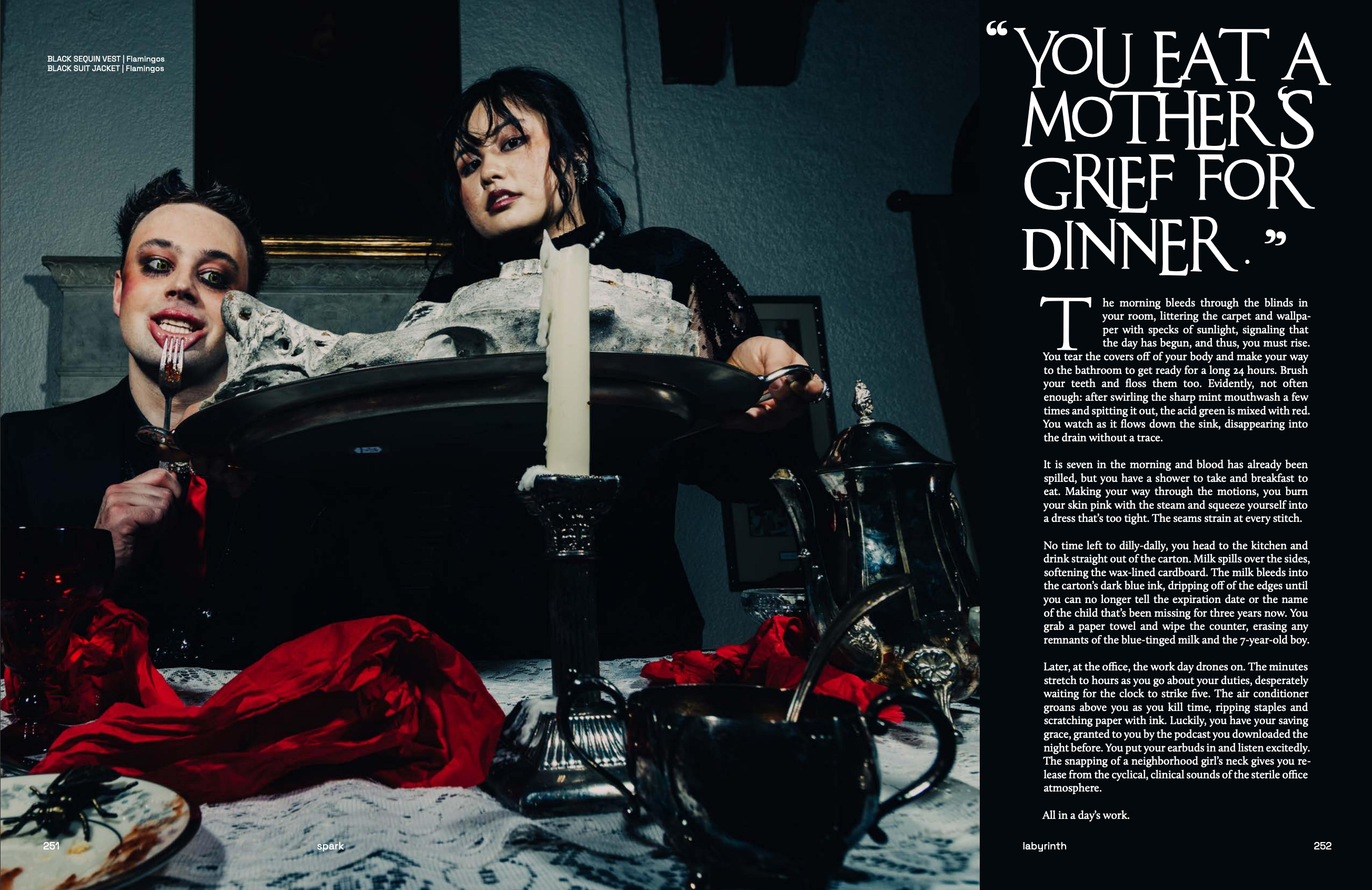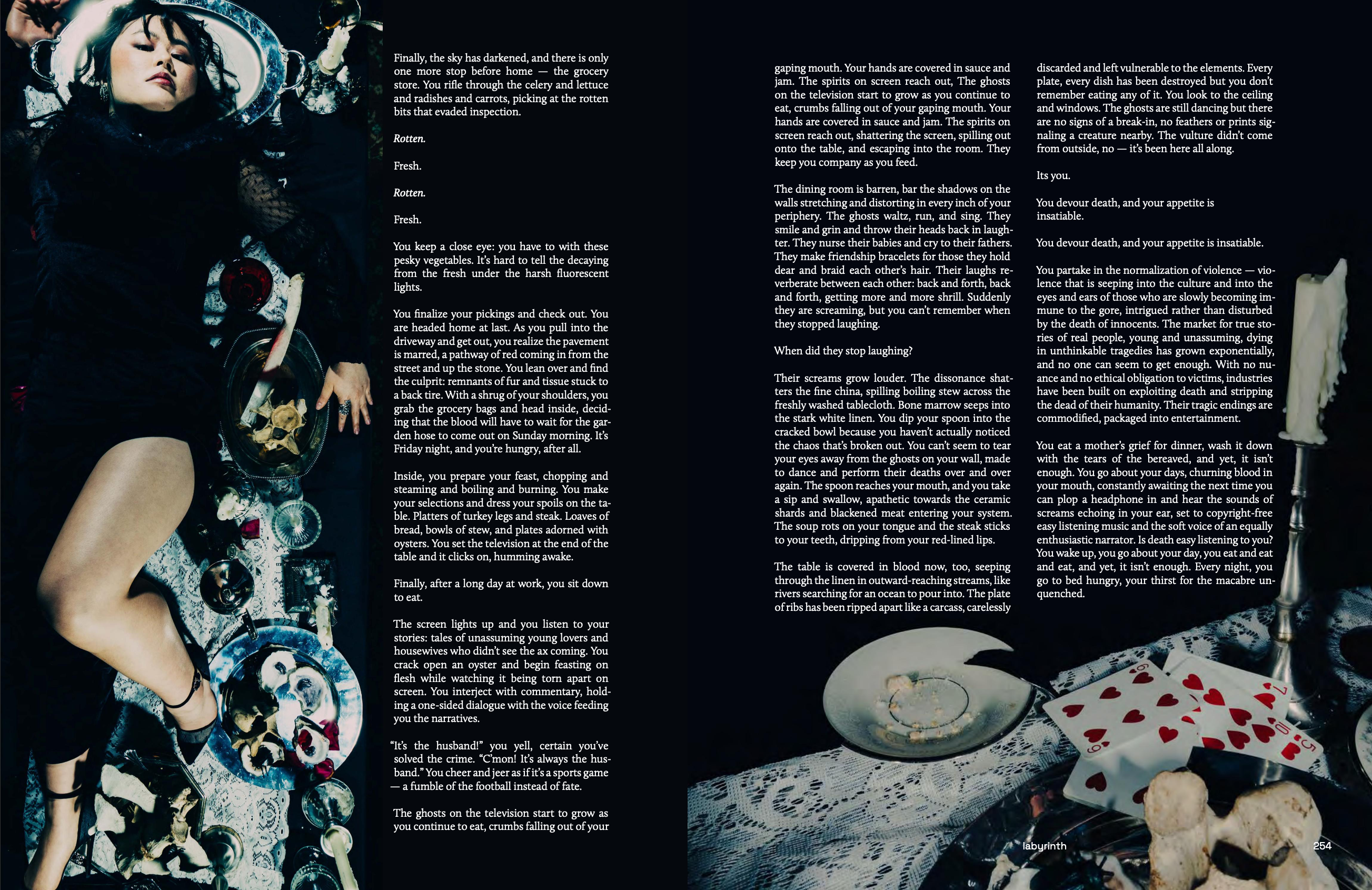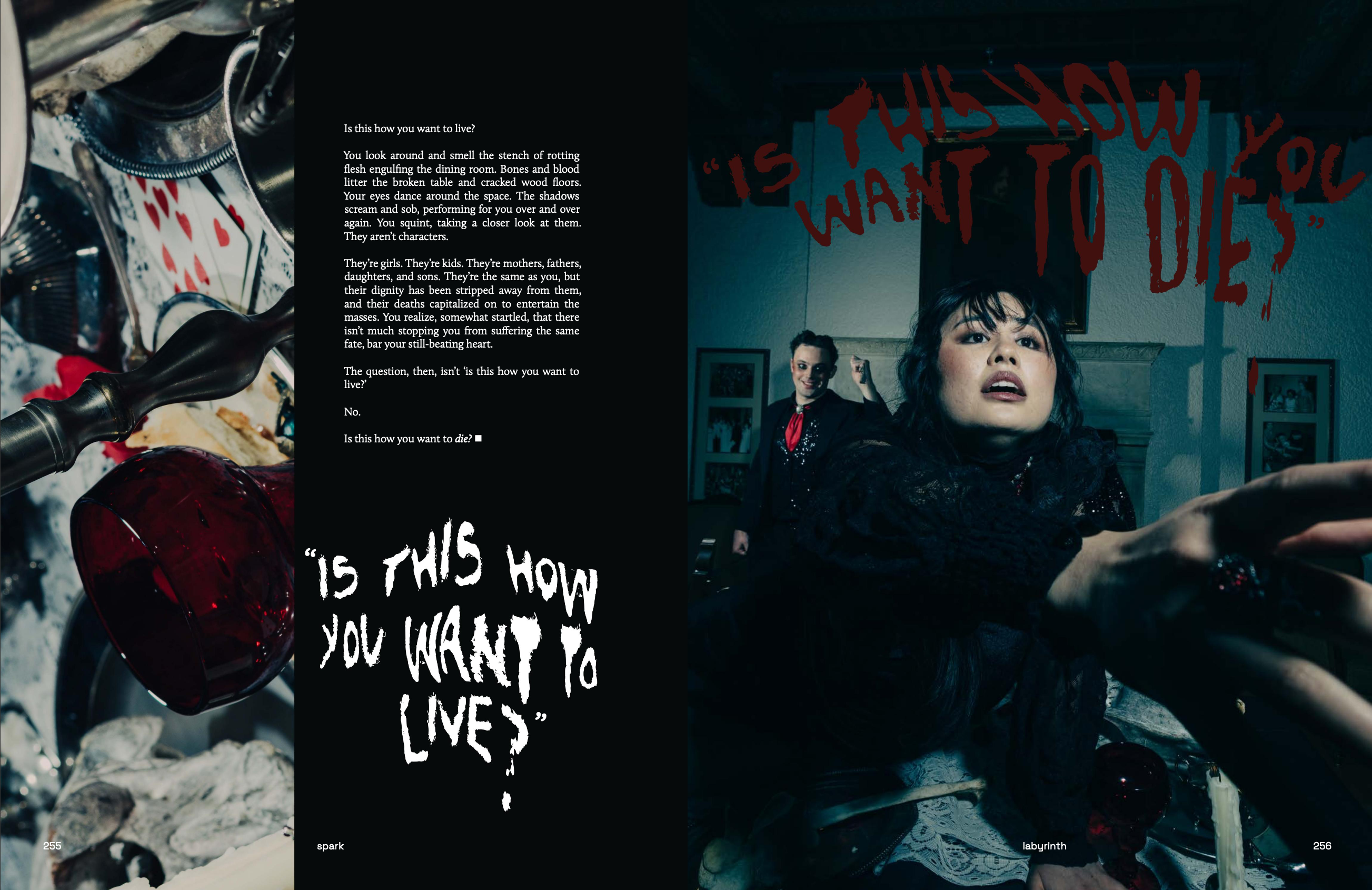CONSUMING MORTALITY

| You eat a mother’s grief for dinner. |
The morning bleeds through the blinds in your room, littering the carpet and wallpaper with specks of sunlight, signaling that the day has begun, and thus, you must rise. You tear the covers off of your body and make your way to the bathroom to get ready for a long 24 hours. Brush your teeth, and floss them too. Evidently, not often enough: after swirling the sharp mint mouthwash a few times and spitting it out, the acid green is mixed with red. You watch as it flows down the sink, disappearing into the drain without a trace.
It is seven in the morning and blood has already been spilled, but you have a shower to take and breakfast to eat. Making your way through the motions, you burn your skin pink with the steam and squeeze yourself into a dress that’s too tight. The seams strain at every stitch.
No time left to dilly-dally, you head to the kitchen and drink straight out of the carton. Milk spills over the sides, softening the wax-lined cardboard. The milk bleeds into the carton’s dark blue ink, dripping off of the edges until you can no longer tell the expiration date or the name of the child that’s been missing for three years now. You grab a paper towel and wipe the counter, erasing any remnants of the blue-tinged milk and the 7-year-old boy.
Later, at the office, the work day drones on. The minutes stretch to hours as you go about your duties, desperately waiting for the clock to strike five. The air conditioner groans above you as you kill time, ripping staples and scratching paper with ink. Luckily you have your saving grace, granted to you by the podcast you downloaded the night before. You put your earbuds in and listen excitedly. The snapping of a neighborhood girl's neck gives you release from the cyclical, clinical sounds of the sterile office atmosphere.
All in a day’s work.
Finally, the sky has darkened, and there is only one more stop before home — the grocery store. You rifle through the celery and lettuce and radishes and carrots, picking at the rotten bits that evaded inspection.
Rotten.
Fresh.
Rotten.
Fresh.
You keep a close eye: you have to with these pesky vegetables. It’s hard to tell the decaying from the fresh under the harsh fluorescent lights.
You finalize your pickings and check out. You are headed home at last. As you pull into the driveway and get out, you realize the pavement is marred, a pathway of red coming in from the street and up the stone. You lean over and find the culprit: remnants of fur and tissue stuck to a back tire. With a shrug of your shoulders, you grab the grocery bags and head inside, deciding that the blood will have to wait for the garden hose to come out on Sunday morning. It’s Friday night, and you’re hungry, after all.

Inside, you prepare your feast, chopping and steaming and boiling and burning. You make your selections and dress your spoils on the table. Platters of turkey legs and steak. Loaves of bread, bowls of stew, and plates adorned with oysters. You set the television at the end of the table and it clicks on, humming awake.
Finally, after a long day at work, you sit down to eat.
The screen lights up and you listen to your stories: tales of unassuming young lovers and housewives who didn’t see the ax coming. You crack open an oyster and begin feasting on flesh while watching it being torn apart on screen. You interject with commentary, holding a one-sided dialogue with the voice feeding you the narratives.
“It’s the husband!” you yell, certain you’ve solved the crime. “C’mon! It’s always the husband.” You cheer and jeer as if it’s a sports game — a fumble of the football instead of fate.
The ghosts on the television start to grow as you continue to eat, crumbs falling out of your gaping mouth. Your hands are covered in sauce and jam. The spirits on screen reach out, shattering the screen, spilling out onto the table, and escaping into the room. They keep you company as you feed.
The dining room is barren, bar the shadows on the walls stretching and distorting in every inch of your periphery. The ghosts waltz, run, and sing. They smile and grin and throw their heads back in laughter. They nurse their babies and cry to their fathers. They make friendship bracelets for those they hold dear and braid each other’s hair. Their laughs reverberate between each other: back and forth, back and forth, getting more and more shrill. Suddenly they are screaming, but you can’t remember when they stopped laughing.
When did they stop laughing?
Their screams grow louder. The dissonance shatters the fine china, spilling boiling stew across the freshly washed tablecloth. Bone marrow seeps into the stark white linen. You dip your spoon into the cracked bowl because you haven’t actually noticed the chaos that's broken out. You can’t seem to tear your eyes away from the ghosts on your wall, made to dance and perform their deaths over and over again. The spoon reaches your mouth, and you take a sip and swallow, apathetic at the ceramic shards and the blackened meat entering your system. The soup rots on your tongue and the steak sticks to your teeth, dripping from your red-lined lips.

The table is covered in blood now, too, seeping through the linen in outward-reaching streams, like rivers searching for an ocean to pour into. The plate of ribs has been ripped apart like a carcass, carelessly discarded and left vulnerable to the elements. Every plate, every dish has been destroyed but you don’t remember eating any of it. You look to the ceiling and windows. The ghosts are still dancing but there are no signs of a break-in, no feathers or prints signaling a creature nearby. The vulture didn’t come from outside, no— it's been here all along.
It’s you.
You devour death, and your appetite is insatiable.
You partake in the normalization of violence — violence that is seeping into the culture and into the eyes and ears of those who are slowly becoming immune to the gore, intrigued rather than disturbed by the death of innocents. The market for true stories of real people, young and unassuming, dying in unthinkable tragedies has grown exponentially, and no one can seem to get enough. With no nuance and no ethical obligation to victims, industries have been built on exploiting death and stripping the dead of their humanity. Their tragic endings are commodified, packaged into entertainment.
You eat a mother’s grief for dinner, wash it down with the tears of the bereaved, and yet, it isn’t enough. You go about your days, churning blood in your mouth, constantly awaiting the next time you can plop a headphone in and hear the sounds of screams echoing in your ear, set to copyright-free easy listening music, and the soft voice of an equally enthusiastic narrator. Is death easy listening to you? You wake up, you go about your day, you eat and eat and eat, and yet, it isn’t enough. Every night, you go to bed hungry, your thirst for the macabre unquenched.
Is this how you want to live?
You look around and smell the stench of rotting flesh engulfing the dining room. Bones and blood litter the broken table and cracked wood floors. Your eyes dance around the space. The shadows scream and sob, performing for you over and over again. You squint, taking a closer look at them. They aren’t characters.
They’re girls. They’re kids. They’re mothers, fathers, daughters, and sons. They’re the same as you, but their dignity has been stripped away from them, and their deaths capitalized on to entertain the masses. You realize, somewhat startled, that there isn’t much stopping you from suffering the same fate, bar your still-beating heart.

The question, then, isn’t ‘is this how you want to live?’
No.
Is this how you want to die? ■
Layout: Camille Chuduc
Photographer: Shreya Ayelasomayajula
HMUA: Tiffany Sun
Stylists: Rey Tran & Hairuo Yi
Set Stylist: Caroline St. Clergy
Models: Seth Endsley Quinn & Tiffany Sun
Other Stories in Labyrinth
© 2025 SPARK. All Rights Reserved.
